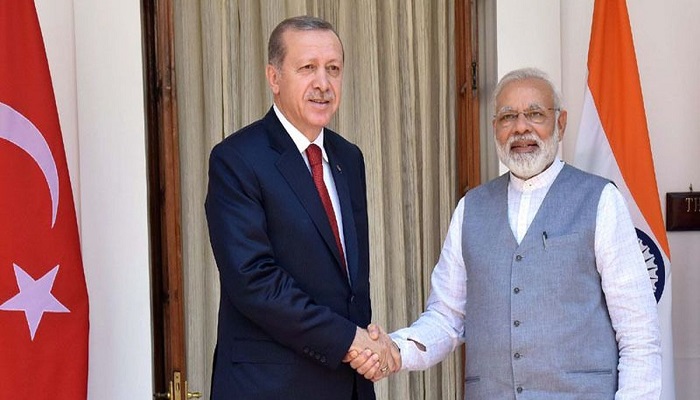India and Turkey are two modern nation-states that share many historical similarities in the formation of their state and society. The two nations have an endless history of civilizations, to the extent that they contradict each other at times. Mustafa Kemal of Turkey laid the foundation of a new republic that effectively made Turkey a member of the community of modern nation-states, leaving behind a legacy of empires.
Indians also stood up against the British Empire to build a new nation for themselves based on the ideas of equality, liberty and justice. Both the countries share a lot in their experiences of building a new nation without breaking away from their past. One of the memories of their past, which both countries still cherish, is the civilizational ties between the two peoples stretching from Anatolia to India. Both countries often take these historical and civilizational ties as the context of their present and future bilateral relations. Sultan Suleiman’s Admiral Ottoman Admiral Sidi Reis had a surprise visit to India in 1555, when his ship was pushed off the coast of Gujarat by a powerful storm. Upon his return to Anatolia, after spending nearly six months, his memoir, Mirat ul Memalik, explains the Ottoman fascination with Indian society and culture. Since then, Ottoman-Indian embassies have continued to exchange and reciprocate their relations. Turkey’s geo-strategic perception of India, however, began to change after the subcontinent came under direct control of British colonial rule. The Russian Empire wanted to challenge British rule by invading parts of India through Afghanistan and Tibet.
The British Empire found it convenient to offer Turkey a greater role in Asia and India to keep Russian expansion under control. In the Russo-Turkish War of 1876, Britain and local Indian rulers provided financial aid to Turkey after Turkey lost the war. Since then, Turkey has gained more sympathy as Turkey is seen as an ally. For much of the nineteenth and twentieth centuries, Turkey–India relations saw the most active and frequent diplomatic, cultural, people-to-people and political contacts. Most of the Indo-Turkish political and strategic perspectives have taken shape in these encounters. As British-Turkish relations subsequently deteriorated, Turkey began to support local Indian rulers and pro-independence forces. Istanbul gradually emerged as the main transit point for Indian revolutionaries seeking a safe journey from India to Europe. Before declaring India’s first government in exile in Kabul in 1915, Raja Mahendra Pratap Singh saw the audience of the Ottoman Sultan Reshad at least twice.
However, with the tragic partition of India, Turkey faced at least three challenges. None of the Turks and early Republican politicians expected such a split. Turkey had to divide its India policy into two parts. An undivided India might have retained the same threat perception to the Soviet Union. With Pakistan already in the western alliance, India had nothing to worry about the expansion of the Soviet Union. Turkey tried to find a middle ground when the Turkish delegation met Nehru at the Bandung Conference in 1955. Indians were astonished to see Turkish representatives speaking enthusiastically against Western imperialism. Third, with the end of the Cold War, Turkey lost much of its importance in the West’s perception of a Russia-centered threat. The never-ending wait for EU accession became a political and strategic obligation for Turkey. Presidents Turgut Ozal and Recep Tayyip Erdogan had to reset Turkey’s foreign policy for a post-Cold War world, where Turkey could expand its ties beyond West-centrism. However, Turkey’s quest for a post-Cold War world view is only moving forward.
Similarly, in Libya, Turkey and Russia have emerged as two major players in bringing peace and stability to Libya. Turkish drones are already flying over Eurasian, European, African and West Asian skies. Turkey has followed the Indian approach towards Africa to be a development partner. The two countries can cooperate in Africa to help Africa diversify its trade and development ties. Turkey has cooled its feud with the UAE, Saudi Arabia and Egypt. Turkey has had to stay there for a variety of reasons, including striking a balance with both Iran and Israel. India has improved its relations with its unique balancing act, the Persian Gulf Quad (India, Israel, the United Arab Emirates and the United States of America). India and Turkey have no differences on key international cooperation issues including trade, investment, climate change, maritime security and reforms in the United Nations. A fresh start may not be unrealistic, but only by opening up new forums of dialogue like think tanks, academic and cultural exchanges can help them to accept the new realities and use the new opportunities that the two countries share with each other. provide to.



